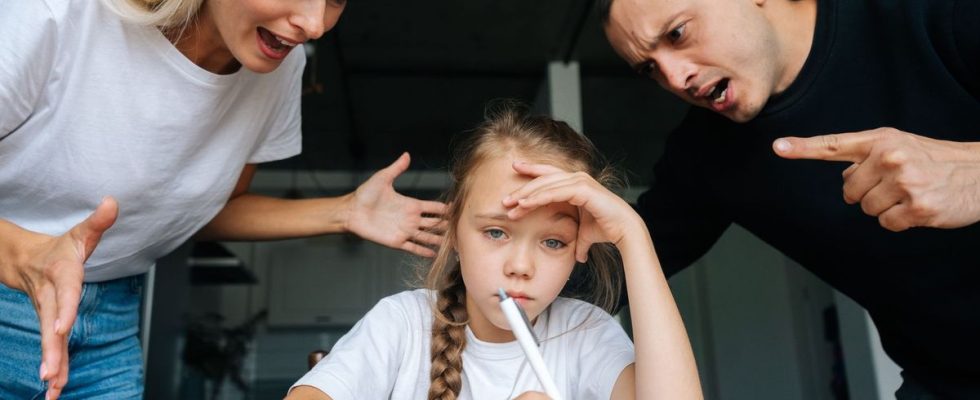Published on
Updated
Reading 3 min.
According to a British study, shouting and verbal abuse towards children causes the same emotional distress in them as physical abuse. Essential insight for rethinking your relationship of authority. Héloïse Junier, psychologist specializing in early childhood, tells us about it.
Losing your temper and raising your voice at your child happens to everyone. But the daily practice of verbal violence and denigrating terms (you are “stupid”, “useless”, “lazy”…) would have as many harmful consequences as long-term physical or even sexual violence on children. This is a study published in the journal Child Abuse & Neglect who reveals it to us today.
Depression, addictions, repetitions of violence
Thus, according to 149 quantitative research studies and 17 works, verbal violence which involves denigration, howling, shouting and repeated threats by parents, but also by teachers, could have emotional and psychological consequences, up to ‘adulthood. This practice is often the cause of poor anger management, depression, or even self-harm.
“Using words to intimidate, shame and control may seem less harmful than physical violence. But the same risks accompany this abusive use of language: low self-esteem, increased consumption of nicotine, alcohol and substances, increased risk of anxiety, depression [et] even psychotic disorders.” the study indicates.
The psychological side would therefore be the most harmed by this trivialized violence. But the consequences would be very real: “They are associated with persistent psychological distress, complex emotional and relational difficulties, physical and mental disorders, an increased likelihood of recreating violent situations in their lives, for example finding a partner who mistreats them, as well as to repeat the violence with other members of their entourage.”
“Violence still too underestimated” for our child psychologist
For Héloïse Junier, early childhood psychologist, this study underlines an observation which is not new, since already in 2012 the American Academy of Pediatrics revealed that verbal violence was the most widespread mistreatment, but also the most trivialized in the daily lives of children, and therefore probably underestimated.
“We have long suspected the unfavorable impact of this action on the child. The problem is also that there are screams and screams, with subcategories (volume, tone, frequency, content of the subject…), which can range from simple to double in terms of consequences. However, it remains difficult to isolate the impact of this mistreatment from other factors, in the authoritarian style of the parents for example. In addition, violence Verbal statements do not leave physical traces. It is therefore interesting to have a study which says things in black and white, and which is currently circulating on the networks.”
According to the publication, today there are more children victims of verbal violence than of physical or sexual violence, and this figure is increasing from year to year.
Realize your impact as a parent
Through this study, it is therefore the way in which we establish authority that is questioned. And how we could do better to raise our children with confidence. Awareness is necessary: ”A survey by the Children’s Foundation already showed in 2022 that physical violence had been decreasing since 2019, but that psychological violence was increasing, because parents who want to avoid violence are shouting more.
In light of this study, it seems obvious that yelling or humiliating your child is not a solution either.
“Parents must realize their own impact and the weight of their words. And realize that if it is not possible to stop shouting, to belittle your child, it is however possible to work on oneself, to consult and to be accompanied.”
Finally, if the loss of freedom is human, when dealing with children, it is also possible to take a step back, to isolate yourself to breathe, or to find a solution so as not to end up making hurtful comments. The future of our children is still at stake.

